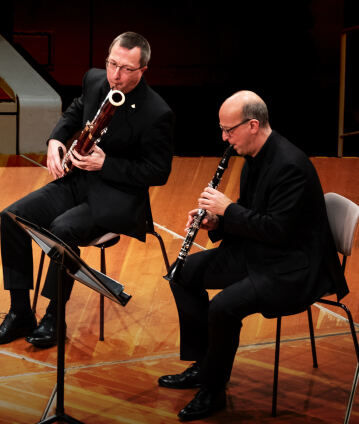“Beethoven in close-up” – part 1

A feast for all Beethoven lovers: our streaming event Beethoven in close-up celebrates the 250th anniversary of the composer’s birth with the performance of all his string quartets and other chamber music for wind instruments. The recordings of the concerts from the Chamber Music Hall of the Philharmonie Berlin were broadcast in the Digital Concert Hall between 14 and 17 December 2020, around the date of Beethoven’s anniversary. Part 1 is dedicated to the early works with wind ensembles.
When we talk about Beethoven’s chamber music, most people think of string quartets – a genre that the composer influenced like no other. But the first chamber music works that the young Beethoven produced were mainly dominated by wind instruments. This was no accident: after Emperor Joseph II founded his “Harmoniemusik”, which performed in octet formation, at the Viennese court in 1782, his brother Maximilian did the same – and established his own in Bonn. Beethoven drew further inspiration from Vienna from the works of Wolfgang Amadeus Mozart. The model seems to emerge from almost all the works in this programme – especially the variations on “Là ci darem la mano”, the Quintet op. 16, which echoes an aria from Don Giovanni, and the Adagio of the Sextet op 71.
The high opus number 103 for the Octet in E-flat major is misleading – the early work dates from the time of the founding of the “Harmoniemusik” in Bonn and was later arbitrarily placed in a blank space in the work register. The demands Beethoven makes of the performers in this large-scale work already go beyond that of mere music for entertainment purposes.
Speaking of demands: the horn and the “tricks usually kept secret by virtuosos”, according to Beethoven, particularly interested him. In the Rondo WoO 25, but especially in the Sextet op. 81b, he offers the horn pairs the opportunity to demonstrate their entire artistry with half and stopped notes.
Of the three trios performed here, the one for clarinet, cello and piano is the most famous – Beethoven composed wonderful variations on a popular operatic melody in the third movement. The programme comes to an upbeat close with the Septet op. 20, about whose conclusion Beethoven biographer Alexander Thayer commented: “Everything breathes joy at something achieved”.
© 2020 Berlin Phil Media GmbH